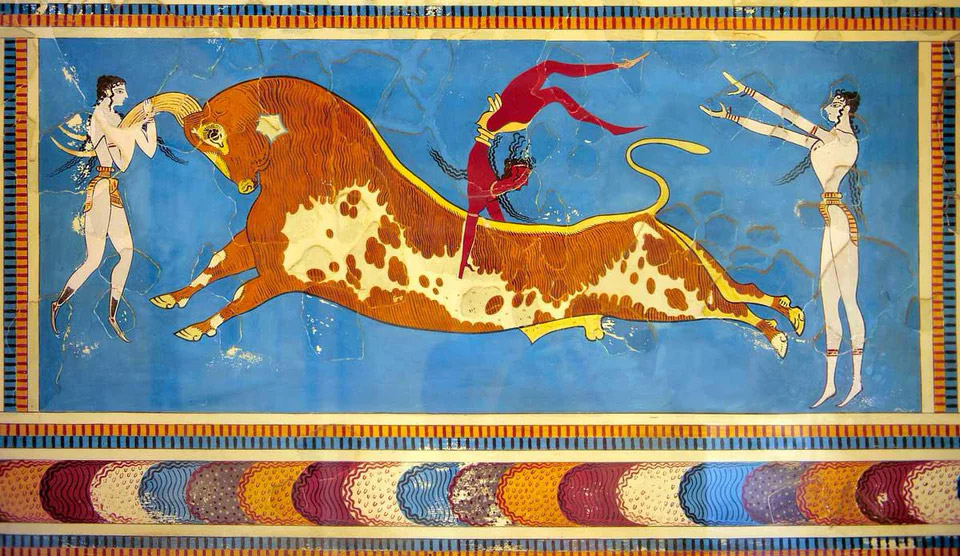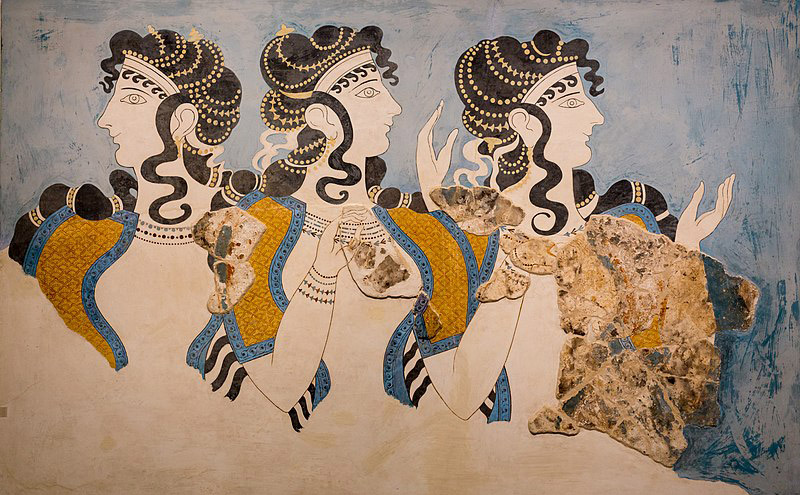The Songs | The Characters | Synopsis | Composer’s Note

The Songs
The score has 18 musical numbers, including 6 for chorus:
Act One
WITH MY OWN EYES – King Aegeus
IT’S GOOD TO BE HOME – Theseus, Chorus
I’VE WON THE LOTTERY – Athenian slaves
THE ELITE OF CRETE – Chorus
MY MINOTAUR – King Minos
THESEUS’ PRAYER – Theseus
WE’LL SAIL AWAY – Ariadne
THE FIRST DAY OF THE REST OF OUR LIVES – Athenian slaves
IN THE LABYRINTH (instrumental)
BELIEVE IN TOMORROW – Cretan slaves
Act Two
HOMEWARD – Chorus, Theseus, Ariadne
ARIADNE’S THREAT – Ariadne
REACHING OUT – Zoe
SHEER EXHILARATION – Icarus, Daedalus, Chorus
THESEUS’ VOW – Theseus
A FEAST FIT FOR A KING – Chorus
The Characters

There are 8 principal male roles, and 5 female; plus numerous smaller roles, and chorus. A cast of about 30 or more is required.
ATHENS
Aegeus, King of Athens – benevolent, but ageing and over-emotional
Theseus, Prince of Athens, Aegeus’ son – heir to the Athenian throne, and the hero of the story. Age around 20.
Lottery winners (Athenian slaves under the age of 30):
Agnes, a weaver – sweet-natured
Nina, a cleaner – simple-hearted
Alex, a farmhand – cheerful & energetic
Cyril, a policeman – depressed
Doris, a cook – stressed, garrulous
Georgio, a miner – grim, but clinging to hope
CRETE
Minos, King of Crete – a cruel but charismatic tyrant. Middle-aged.
Zoe, his consort – well-meaning, age about 25
Princess Ariadne, King Minos’ daughter, age about 18. A keen dancer. Headstrong, idealistic; strongly disapproves of her father.
Daedalus, the state architect, a master craftsman
Icarus, his son and apprentice, age early 20s – not very bright, and hopelessly in love with Ariadne
Synopsis
The story takes place in ancient Athens and Crete.
Prologue
King Minos of Crete comes to the Delphic Oracle and asks advice on what to do with the creature that has recently arrived in Crete. It is half man and half bull, and will only feed on humans. The oracle advises Minos to house the beast in a labyrinth, and not to let it starve…
ACT ONE
A few years later, King Aegeus of Athens is in his palace. His son and heir, Prince Theseus, went travelling three years ago, and Aegeus longs to see him again. Then news arrives that Theseus’ ship has been sighted – the prince is returning! Theseus enters to general rejoicing; he sings of his adventures.
The six annual Athenian lottery winners approach the palace. They will sail at dawn on their ‘voyage of discovery’.
Theseus asks his father about the lottery – Aegeus explains that it was started a few years ago while Theseus was away; each year six young men and women win the chance to go on a mystery voyage to Crete. Pressing his father further, Theseus learns the ghastly secret that these six young people are in fact food for the minotaur – this annual human cost was the price Aegeus agreed to avoid being invaded by King Minos and his Cretan army. Theseus vows to go on the voyage and try and kill the minotaur; Aegeus begs him not to, in vain. Then the King says: ‘Promise me that, if you survive, you will replace the boat’s black sails with white ones, so that I shall know you are alive as I see the ship returning’. Theseus agrees, and the ship sails for Crete.
A glamorous party takes place at Knossos Palace in Crete. Princess Ariadne, King Minos’ daughter, dances for the guests, and King Minos pays tribute to his state architect, Daedalus. Daedalus and his son Icarus designed the labyrinth which houses the Minotaur. Icarus loves Princess Ariadne, but it is unrequited.
Then the ship arrives carrying the young Athenians. Princess Ariadne knows the fate that awaits these Athenian visitors, and vows to try and save Theseus.
In his quarters, Theseus prays for help in tomorrow’s ordeal. Then Ariadne appears; she gives Theseus a ball of silver thread, which she received from Icarus. If Theseus kills the minotaur, the thread will help him escape from the labyrinth. Ariadne wants to leave Crete, and Theseus agrees to take her away on the ship tomorrow if he survives.
Next day King Minos urges the Athenians to explore the labyrinth; Theseus goes first, and kills the Minotaur. He and the other Athenians, with Ariadne, escape from Crete in their ship.
King Minos jails Daedalus and Icarus in a tower (the labyrinth was supposed to be escape-proof); he also orders the execution of Gregory, his chief of staff, for allowing the Athenians to get away. The Cretan slaves, friends of Gregory, decide to try and persuade Nekros not to carry out the execution…
ACT TWO
The Athenians are sailing home. Ariadne saved Theseus’ life, but to his dismay she seems to assume that they will settle down together when they reach Athens. He tricks her into getting off the ship at the island of Naxos, and then sails off, abandoning her there.
In the tower, Daedalus and Icarus plan their escape – they will make wings from feathers, twigs and wax, and try to fly away.
Back on the ship, Theseus is feeling guilty about having abandoned Ariadne. He distracts himself by talking with the Athenian slaves, and forgets his father’s request to change the black sails to white ones.
On Naxos, Ariadne is angry at having been abandoned; she vows to be revenged on Theseus.
Zoe sings of her problems loving her husband, King Minos. Minos discovers that Daedalus and Icarus have escaped. Zoe annoys him, and he summons the executioner; but Zoe (like Gregory earlier) is secreted away to safety.
In Athens, Nina, Doris and Agnes (the three female slaves) discuss the tragic death of King Aegeus – having seen the ship returning with black sails, he believed Theseus to be dead, and threw himself to his death in the sea below. Then they see two large, winged creatures in the sky – Icarus and Daedalus! They have escaped from Crete, and are flying northward. Daedalus reminds Icarus not to fly too high or too low; but Icarus flies too close to the sun, and plummets to his death in the sea below. Daedalus flies on to Athens.
Theseus vows to serve as King of Athens to the best of his ability. Daedalus is appointed Athens’ state architect; the six slaves are granted their freedom, and a great feast is held, during which King Minos appears, demanding that Daedalus returns to Crete. Theseus agrees to discuss this, but first invites Minos to join them at dinner. Minos’ food is poisoned, and he dies.
Epilogue
A few weeks later, news reaches King Theseus: Ariadne has been crowned Queen of Crete, and is preparing to attack Athens. A summit meeting takes place on Naxos; Ariadne is pleased to learn that Theseus killed King Minos, and peace is agreed.

Composer’s Note
I’ve always loved Greek myths, and I thought the story of Theseus and Ariadne had potential as a musical (several composers have composed operas based on this subject – Handel and Richard Strauss, for example – but I’m not aware of any previous musicals). It seemed to have a natural dramatic structure, and the first version of my show was finished in 2019.
That summer I went on holiday to Crete, and I visited the Knossos Palace ruins, and the incredible museum in nearby Heraklion, filled with wonderful objects dating from that time (about 3500 years ago). It was inspirational to be reminded that there is a historical basis for this myth; many of the characters in this story may really have existed. Following this trip I expanded my show further.
Greek myths tend to be male-dominated, a reflection of how life was at that time. In my show I decided to make Ariadne a stronger character than she usually seems to be, and I also altered the story slightly in her favour. As it happens, there has been something of a vogue for ‘female-friendly’ versions of Greek myths recently – several books have been published, retelling them from a female point of view (including one called Ariadne, by Jennifer Saint, which came out in 2021).
The pandemic put all theatrical endeavours on hold for a while, so I was delighted when St Michael’s Catholic Grammar School decided to premiere the show in March 2022.
Philip Godfrey
